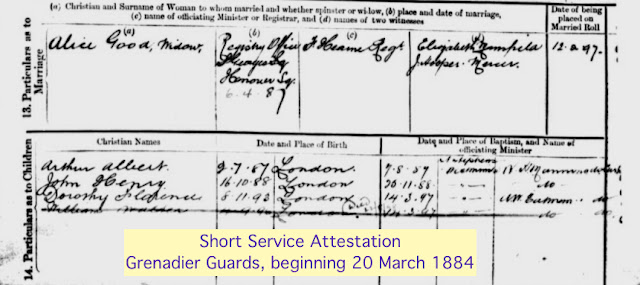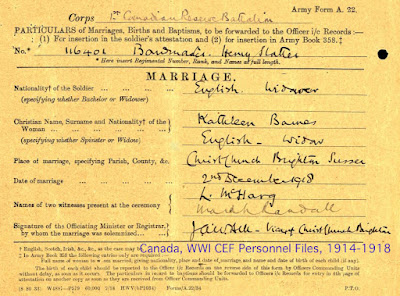Reading through the detailed British and Canadian military records available for my hubby's great uncle, Henry Arthur Slatter (1866-1942), I found lots of non-military details that helped build a picture of the boy, the man, and his family. Physical descriptions, health and dental details, but also clues to major turning points in his life.
Born in the gritty Whitechapel section of London, Henry and two of his older brothers were preteens when they were put into a training program designed to give pauper boys the skills to serve in the military or at least have a trade. All three flourished in the program, becoming accomplished musicians well suited to the military life. After they grew up and continued their military careers, they all left England to become well-known bandmasters in Canada.
From poverty to bandmaster
Reading the records, it was clear Henry lied about his age to join the military. Both the official birth index and his baptism record show a birth year of 1866. Yet somehow Henry was recorded as being 17 (instead of 15) years old in the 1881 UK Census, where he was a private in the 7th Fusiliers.
In 1884, he added two years to his actual age and enlisted as a 20-year-old when he joined the Grenadier Guards. Those records were lengthy!
One son died young
As shown at top in an excerpt from the pension pages in the file, Henry and his wife, Alice Winter Good (1864-1914), had four children...but unfortunately, one child is crossed out in the listing, with a notation about his early death.
I had previously found little William Matthew Slatter's birth, but not his death. Now Henry's military record gave me a death date for this young son, as well.
After serving in the Grenadier Guards and earning a pension, Henry moved his family to Vancouver. In 1912 Henry was serving as bandmaster for the 72nd Seaforth Highlanders. Then World War I began and more tragedy struck Henry's family.
On Christmas Day of 1914, Henry's wife Alice died. Their son Arthur Albert Slatter (1887-1917) was killed in action with the London Regiment of the 20th Battalion of the Royal Fusiliers, during fierce fighting in Europe (his name is now on the Arras Memorial in France).
Second marriage details
The military files note that Henry enlisted in the WWI Canadian Expeditionary Forces, serving in England with the 1st Canadian Reserve Battalion.
Shown above is part of a page from his thick WWI CEF file. On November 14, 1918, the CO granted permission for Henry to remarry. He was 52 at the time.
Also in the file is a detailed card showing the bride as Kathleen Barnes, an "English widow" and the groom as an "English widower." They were married on December 2, 1918, in Christ Church, Brighton, Sussex, and the card even includes witness names.
Wonderful genealogical details but also good for me to see that he was not alone. According to the military examiners, Henry Arthur Slatter was generally healthy, did not have any medical complaints (although he did have poor eyesight), and didn't look his age. Reading their comments gave me more of a sense of the human being, not just the military man.
No wonder I scour every page of every military record in search of details that add to my knowledge of an ancestor's life beyond the service.





